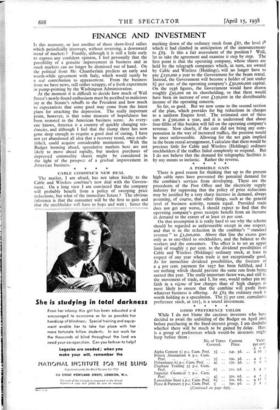CABLE COMBINE'S NEW DEAL
The market, I am afraid, has not taken kindly to the Cable and Wireless combine's new deal with the Govern- ment. On a long view I am convinced that the company will probably benefit from a policy of sweeping price reductions, but what of the immediate future ? The obvious inference is that the consumer will be the first to gain and that the stockholder will have to hope and wait ; hence the marking down of the ordinary stock from £67, the level to which it had climbed in anticipation of the announcement, to £63. Is this a fair assessment of the position ? Well, let us take the agreement and examine it step by step. The first point is that the operating company, whose shares are held by the telegraph companies which, in turn, are owned by Cable and Wireless (Holdings), will no longer have to pay L250,000 a year to the Government for the beam rental. Instead, the Government will become a holder of just under 81 per cent. of the operating company's L30,000,000 capital. On the 1936 figures, the Government would have drawn roughly £95,000 on its shareholding, so that there would have been an increase of over £150,000 in the distributable income of the operating concern.
So far, so good. But we now come to the second section of the plan, which provides for big reductions in charges to a uniform Empire level. The estimated cost of these cuts is k500,000 a year, and it is understood that about four-fifths of this burden will fall on the operating company's revenue. Now clearly, if the cuts did not bring any com- pensation in the way of increased traffics, the position would be most unfavourable. Allowing for the net gain implied in the beam rental arrangement, I calculate that there would be precious little for Cable and Wireless (Holdings) ordinary stockholders if the traffics failed completely to respond. But I do not believe that the demand for telegraphic facilities is by any means so inelastic. Rather the reverse. * * * *






































 Previous page
Previous page